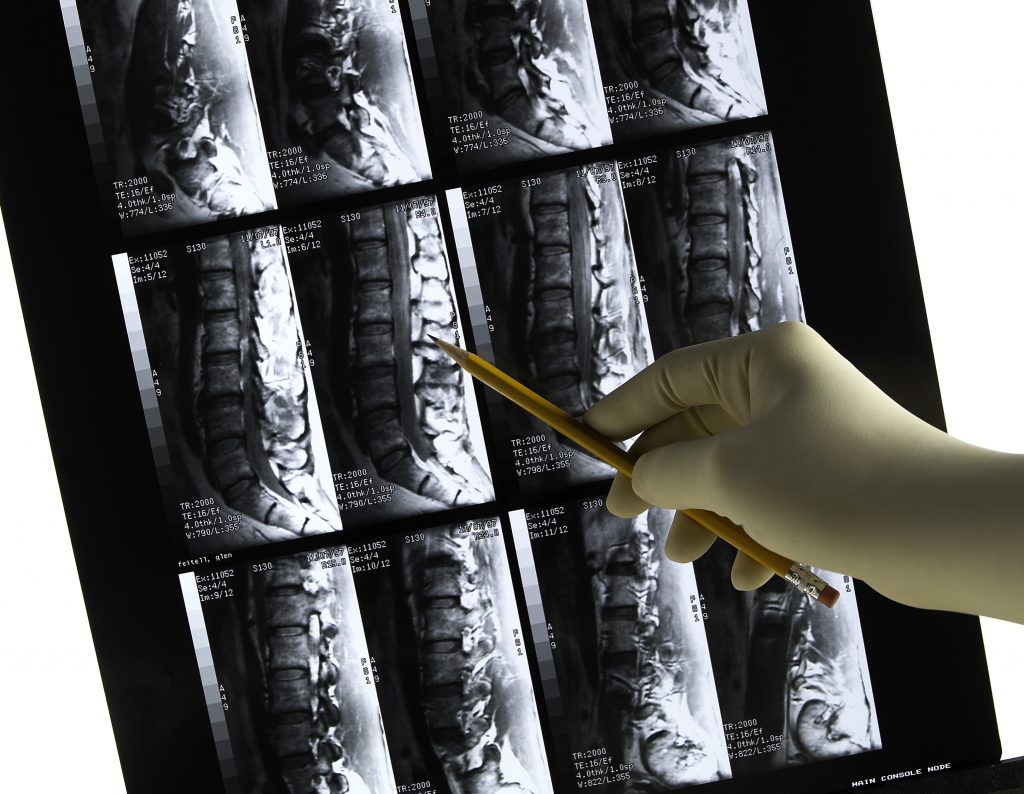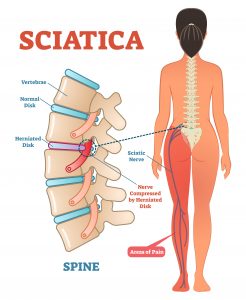Slipped Discs: Signs and Treatments

Slipped discs are a commonly feared yet overly self-diagnosed ailment, and with this in mind, I thought it’d be good to clear up a few things about what a slipped disc is. Learn more about the symptoms of slipped discs, including how the injury can happen and the treatment options available to you.
What Is A Slipped Disc?
First things first – the anatomy of a slipped disc. The “discs” sit between the vertebrae of the spine, helping you to move freely and help reduce the strain on the bones. The term slipped disc evokes an unwelcome image of something actually slipping through your spine, which isn’t actually the case. In reality, a slipped disc happens when the soft tissue inside the disc bulges out from its inside case.
The best (if slightly garish) way to think about it is to imagine pressing down on a jam doughnut. A slipped disc happens when the pressure gets too much and the “jam” spurts out. The weakest part of the disc is at the back, which means that leaning forward can put a great deal of pressure on this part of the disc. In turn, this is why the biggest risk activities for developing a slipped disc can be as benign as sitting at a desk or lifting a few heavy objects improperly.
With this in mind, people often fear getting slipped discs as it can seem like there’s not much you can do to avoid them. The truth is only 2% of adults will ever suffer a slipped disc, and what’s more, the symptoms are usually obvious. The main differences come in how the pain starts and then gets worse.
What Does A Slipped Disc Feel Like?
The first sign of a slipped can disc can coincide with a sudden movement, heavy landing in a slumped position or even a sneeze. Most people feel a twinge at first before a more profound pain (particularly in the legs) later. The usual symptoms can include:
- Back pain or an inability to straighten back
- Numb feeling in the shoulders, back, arms, hands, legs or feet
- Sore neck
- General muscle weakness
At this point, it’s important to note a few factors related to lower back pain, as people can sometimes experience this pain for a number of other reasons. If you have any of the following symptoms, phone your GP immediately, or, if you can’t get an appointment, ask for Ed at the Manchester Wellbeing Clinic or seek another healthcare professional for further advice.
- Abdominal swelling
- Blood in urine or stool
- Changes to bowel and bladder habits (e.g. constipation)
- Fever/fatigue
- Numbness around the genitals
- Severe night pain with night sweats
If you do have any of the symptoms mentioned above, it is important not to panic and remember that disease and infections account for less than 1% of the causes of lower back pain.
Concerned about these symptoms? Call now on 0161 209 3980
How To Treat A Slipped Disc
Treatments for slipped discs will vary from person to person. A minor slipped disc can be easily managed by taking professional advice on correct posture and movement. The more severe cases, which can include leg and glute pain along with pins and needles, are more commonly treated by an osteopath.
Initially, I will work to reduce the pain and inflammation around the slipped disc. This is where dry needling or acupuncture, alongside other techniques that involve work on the spine, will be applied. When the leg symptoms have decreased, we will look to reduce the risk of recurrence by adjusting the spine so there is less pressure on the disc. This process is explained further in the following video:
For more severe and prolonged slipped discs (known as sequestrated discs), osteopathy and manual therapy are advised at first, and this conservative approach is often a good alternative to going under the knife and looking to surgery to rectify the issue. If we don’t see any progress, the next step will be to refer you for a surgical consultation.
Research has suggested that the combined effect of multi-modal, non-traditional therapies such as:
- Herbal supplementation
- Acupuncture
- Bee-venom pharmacopuncture
- Spinal manipulation
can all be very effective; many patients have lauded the effects of these treatments.
Research has also shown that physical therapy, core strengthening and joint mobilisation is a good option for managing slipped discs with only one simple rule – the earlier the treatment, the better the prognosis!
If you’d like to know more about slipped discs, from general concerns to advise or treatment, get in touch with me today for the best care possible.
CALL: 0161 209 3980
EMAIL: info@movementandwellbeingclinic.co.uk
Are there any sources we could link to relating to this information?
